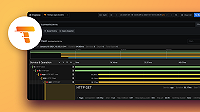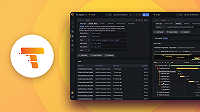This is documentation for the next version of Grafana Tempo documentation. For the latest stable release, go to the latest version.
Azure blob storage permissions and management
Tempo supports Azure blob storage for both monolithic and distributed modes. Some of the supported features include:
- Object layout: custom
container_nameand optionalprefixto nest objects in a shared container. - Performance: hedged requests (
hedge_requests_at,hedge_requests_up_to) to reduce long-tail latency. - Regional or sovereign clouds: configurable endpoint suffix (for example, US Gov, Germany) using
endpoint_suffix. - Local development: Azurite emulator support (non-
blob.\*endpoint style is auto-detected). - Ops guidance: compatible with Azure Storage lifecycle policies for cleanup (example provided in the doc).
Tempo supports the following authentication methods:
- Shared key
- Managed Identity (system/user-assigned): use
use_managed_identity,user_assigned_id - Azure Workload Identity (federated token): use
use_federated_token
Before you begin
Tempo requires the following configuration to authenticate to and access Azure blob storage:
Storage Account name specified in the configuration file as
storage_account_nameor in the environment variableAZURE_STORAGE_ACCOUNT.Credentials for accessing the Storage Account that are one of the following:
- Storage Account access key specified in the configuration file as
storage_account_keyor in the environment variableAZURE_STORAGE_KEY. - An Azure Managed Identity that’s either system or user assigned. To use Azure Managed Identities, you need to set
use_managed_identitytotruein the configuration file or setuser_assigned_idto the client ID for the managed identity you’d like to use.- System-assigned managed identity don’t require additional configuration.
- User-assigned managed identity require you to set
user_assigned_idto the client ID for the managed identity in the configuration file.
- Via Azure Workload Identity. To use Azure Workload Identity, you need to enable Azure Workload Identity on your cluster, add the required label and annotation to the service account and the required Pod label. Additionally, you need to set
use_federated_tokentotrueto utilize Azure Workload Identity.
- Storage Account access key specified in the configuration file as
Sample configuration for Tempo monolithic mode
This sample configuration shows how to set up Azure blob storage using Helm charts and an access key from Kubernetes secrets.
tempo:
storage:
trace:
backend: azure
azure:
container_name: container-name
storage_account_name: storage-account-name
storage_account_key: ${STORAGE_ACCOUNT_ACCESS_KEY}
extraArgs:
config.expand-env: true
extraEnv:
- name: STORAGE_ACCOUNT_ACCESS_KEY
valueFrom:
secretKeyRef:
name: secret-name
key: STORAGE_ACCOUNT_ACCESS_KEYAzure Workload Identity
Here is an example configuration using Azure Workload Identity.
tempo:
storage:
trace:
backend: azure
azure:
container_name: container-name
storage_account_name: storage-account-name
use_federated_token: trueSample configuration for Tempo distributed mode
In distributed mode, the trace configuration needs to be applied against the storage object, which resides at the root of the Values object. Additionally, the extraArgs and extraEnv configuration need to be applied to each of the following services:
distributorcompactoringesterquerierqueryFrontend
Distributed mode is usually installed using a Helm chart, like tempo-distributed.
To use this example, add it to your custom.yaml or values.yaml file.
storage:
trace:
backend: azure
azure:
container_name: tempo-traces
storage_account_name: stgappgeneraluks
storage_account_key: ${STORAGE_ACCOUNT_ACCESS_KEY}
distributor:
extraArgs:
- "-config.expand-env=true"
extraEnv:
- name: STORAGE_ACCOUNT_ACCESS_KEY
valueFrom:
secretKeyRef:
name: tempo-traces-stg-key
key: tempo-traces-key
compactor:
extraArgs:
- "-config.expand-env=true"
extraEnv:
- name: STORAGE_ACCOUNT_ACCESS_KEY
valueFrom:
secretKeyRef:
name: tempo-traces-stg-key
key: tempo-traces-key
ingester:
extraArgs:
- "-config.expand-env=true"
extraEnv:
- name: STORAGE_ACCOUNT_ACCESS_KEY
valueFrom:
secretKeyRef:
name: tempo-traces-stg-key
key: tempo-traces-key
querier:
extraArgs:
- "-config.expand-env=true"
extraEnv:
- name: STORAGE_ACCOUNT_ACCESS_KEY
valueFrom:
secretKeyRef:
name: tempo-traces-stg-key
key: tempo-traces-key
queryFrontend:
extraArgs:
- "-config.expand-env=true"
extraEnv:
- name: STORAGE_ACCOUNT_ACCESS_KEY
valueFrom:
secretKeyRef:
name: tempo-traces-stg-key
key: tempo-traces-keyAzure Workload Identity
Here is an example configuration using Azure Workload Identity.
tempo:
podLabels:
"azure.workload.identity/use": "true"
serviceAccount:
name: tempo
annotations:
"azure.workload.identity/client-id": <AZURE-APP-CLIENT-ID>
labels:
"azure.workload.identity/use": "true"
storage:
trace:
backend: azure
azure:
container_name: <AZURE-STORAGE-CONTAINER-NAME>
storage_account_name: <AZURE-STORAGE-ACCOUNT-NAME>
use_federated_token: trueUse local_blocks and metrics-generator
By default, the metrics-generator doesn’t require a backend connection unless you’ve enabled the local_blocks processor.
The local_blocks processor is used for generating metrics from traces, which is required for TraceQL metrics
When this configuration is set, the metrics-generator produces blocks and flushes them into a backend storage.
In this case, list the generator in the env var expansion configuration so the STORAGE_ACCOUNT_ACCESS_KEY has the secret value.
You can use this configuration example with Helm charts, like tempo-distributed.
Replace any values in all caps with the values for your Helm deployment.
generator:
extraArgs:
- "-config.expand-env=true"
extraEnv:
- name: <STORAGE_ACCOUNT_ACCESS_KEY>
valueFrom:
secretKeyRef:
name: <TEMPO-TRACES-STG-KEY>
key: <TEMPO-TRACES-KEY>For more information, refer to Configure TraceQL metrics.
Additional configuration options
The following sections provide additional configuration options for Azure blob storage.
Use Azurite for local development
You can use the Azurite emulator to test your Tempo configuration locally. Refer to the Azurite emulator documentation for more details.
Tempo treats any Azure endpoint_suffix that doesn’t start with blob. as Azurite and automatically switches to the emulator URL style.
For more information about the Azurite URL style, refer to the Azure Storage documentation.
Set backend to azure, supply your Azurite account and key, and point endpoint_suffix to the emulator host:port.
Tempo handles the Azurite URL format automatically.
If you encounter any issues, try using the fully qualified domain name (FQDN) for the Azurite emulator.
For example, azurite-host.azure.local:10000.
In this example, replace the example values with your Azure configuration values and then update your Helm deployment.
storage:
trace:
blocklist_poll: 1s
backend: azure
azure:
container_name: container-name # how to store data in azure
endpoint_suffix: azurite-host.svc.cluster.local:10000 # Azurite emulator host:port
storage_account_name: "<STORAGE-ACCOUNT-NAME>"
storage_account_key: "<STORAGE_ACCOUNT_ACCESS_KEY>"Azure blocklist polling
If you are hosting Tempo on Azure, you may need to update two values to ensure consistent successful blocklist polling.
If you experience this issue, try setting blocklist_poll_tenant_index_builders to 1.
Additionally, if you are seeing DNS failures like the ones below, try increasing blocklist_poll_jitter_ms.
Refer to the discussion in GitHub issue 1462.
For example:
reading storage container: Head "https://tempoe**************.blob.core.windows.net/tempo/single-tenant/d8aafc48-5796-4221-ac0b-58e001d18515/meta.compacted.json?timeout=61": dial tcp: lookup tempoe**************.blob.core.windows.net on 10.0.0.10:53: dial udp 10.0.0.10:53: operation was canceledYour final configuration may look something like:
storage:
trace:
blocklist_poll_tenant_index_builders: 1
blocklist_poll_jitter_ms: 500(Optional) Storage Account management policy for cleaning up the storage container
The following Storage Account management policy shows an example of cleaning up files from the container after they have been deleted for a period of time.
{
"id": "/subscriptions/00000000-0000-0000000000000000000000/resourceGroups/resourceGroupName/providers/Microsoft.Storage/storageAccounts/accountName/managementPolicies/default",
"lastModifiedTime": "2021-11-30T19:19:54.855455+00:00",
"name": "DefaultManagementPolicy",
"policy": {
"rules": [
{
"definition": {
"actions": {
"baseBlob": {
"delete": {
"daysAfterLastAccessTimeGreaterThan": null,
"daysAfterModificationGreaterThan": 60.0
},
"enableAutoTierToHotFromCool": null,
"tierToArchive": null,
"tierToCool": null
},
"snapshot": null,
"version": null
},
"filters": {
"blobIndexMatch": null,
"blobTypes": ["blockBlob"],
"prefixMatch": ["tempo-data"]
}
},
"enabled": true,
"name": "TempoBlobRetention",
"type": "Lifecycle"
},
{
"definition": {
"actions": {
"baseBlob": null,
"snapshot": null,
"version": {
"delete": {
"daysAfterCreationGreaterThan": 7.0
},
"tierToArchive": null,
"tierToCool": null
}
},
"filters": {
"blobIndexMatch": null,
"blobTypes": ["blockBlob"],
"prefixMatch": []
}
},
"enabled": true,
"name": "VersionRetention",
"type": "Lifecycle"
}
]
},
"resourceGroup": "resource-group-name",
"type": "Microsoft.Storage/storageAccounts/managementPolicies"
}

